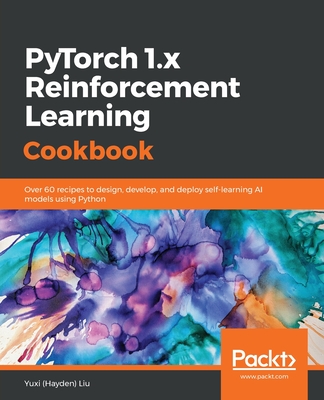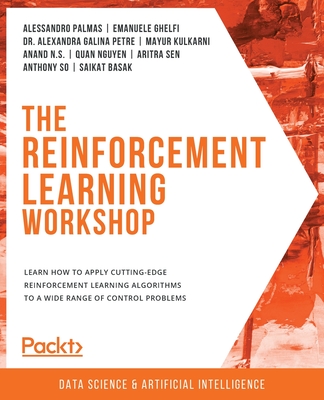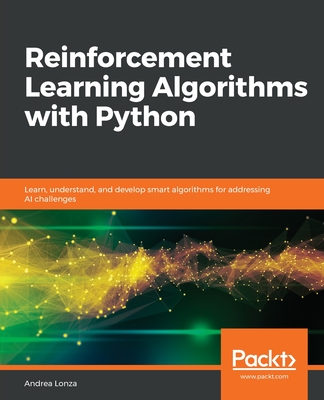PyTorch 1.0 Reinforcement Learning Cookbook
暫譯: PyTorch 1.0 強化學習食譜
Liu, Yuxi (Hayden)
- 出版商: Packt Publishing
- 出版日期: 2019-10-31
- 售價: $1,660
- 貴賓價: 9.5 折 $1,577
- 語言: 英文
- 頁數: 340
- 裝訂: Quality Paper - also called trade paper
- ISBN: 1838551964
- ISBN-13: 9781838551964
-
相關分類:
Reinforcement
海外代購書籍(需單獨結帳)
相關主題
商品描述
Reinforcement learning (RL) is a branch of machine learning that has gained popularity in recent times. It allows you to train AI models that learn from their own actions and optimize their behavior. PyTorch has also emerged as the preferred tool for training RL models because of its efficiency and ease of use.
With this book, you'll explore the important RL concepts and the implementation of algorithms in PyTorch 1.x. The recipes in the book, along with real-world examples, will help you master various RL techniques, such as dynamic programming, Monte Carlo simulations, temporal difference, and Q-learning. You'll also gain insights into industry-specific applications of these techniques. Later chapters will guide you through solving problems such as the multi-armed bandit problem and the cartpole problem using the multi-armed bandit algorithm and function approximation. You'll also learn how to use Deep Q-Networks to complete Atari games, along with how to effectively implement policy gradients. Finally, you'll discover how RL techniques are applied to Blackjack, Gridworld environments, internet advertising, and the Flappy Bird game.
By the end of this book, you'll have developed the skills you need to implement popular RL algorithms and use RL techniques to solve real-world problems.
- Use Q-learning and the state–action–reward–state–action (SARSA) algorithm to solve various Gridworld problems
- Develop a multi-armed bandit algorithm to optimize display advertising
- Scale up learning and control processes using Deep Q-Networks
- Simulate Markov Decision Processes, OpenAI Gym environments, and other common control problems
- Select and build RL models, evaluate their performance, and optimize and deploy them
- Use policy gradient methods to solve continuous RL problems
- Use PyTorch 1.x to design and build self-learning artificial intelligence (AI) models
- Implement RL algorithms to solve control and optimization challenges faced by data scientists today
- Apply modern RL libraries to simulate a controlled environment for your projects
商品描述(中文翻譯)
強化學習(Reinforcement Learning, RL)是機器學習的一個分支,近年來受到廣泛關注。它允許您訓練能夠從自身行動中學習並優化行為的人工智慧(AI)模型。由於其效率和易用性,PyTorch 也成為訓練 RL 模型的首選工具。
在本書中,您將探索重要的 RL 概念以及在 PyTorch 1.x 中實現算法。書中的食譜和實際案例將幫助您掌握各種 RL 技術,例如動態規劃、蒙地卡羅模擬、時間差分(Temporal Difference)和 Q-learning。您還將深入了解這些技術在行業特定應用中的應用。後面的章節將指導您如何使用多臂賭徒算法和函數逼近來解決多臂賭徒問題和倒立擺問題。您還將學習如何使用深度 Q 網絡(Deep Q-Networks)來完成 Atari 遊戲,以及如何有效地實現策略梯度(Policy Gradients)。最後,您將發現 RL 技術如何應用於二十一點(Blackjack)、網格世界(Gridworld)環境、網路廣告和 Flappy Bird 遊戲。
在本書結束時,您將具備實現流行 RL 算法的技能,並能夠使用 RL 技術解決現實世界中的問題。
- 使用 Q-learning 和狀態-行動-獎勵-狀態-行動(SARSA)算法解決各種網格世界問題
- 開發多臂賭徒算法以優化展示廣告
- 使用深度 Q 網絡擴展學習和控制過程
- 模擬馬可夫決策過程(Markov Decision Processes)、OpenAI Gym 環境及其他常見控制問題
- 選擇和構建 RL 模型,評估其性能,並優化和部署它們
- 使用策略梯度方法解決連續 RL 問題
- 使用 PyTorch 1.x 設計和構建自學習的人工智慧(AI)模型
- 實現 RL 算法以解決當今數據科學家面臨的控制和優化挑戰
- 應用現代 RL 庫來模擬您的項目的受控環境











